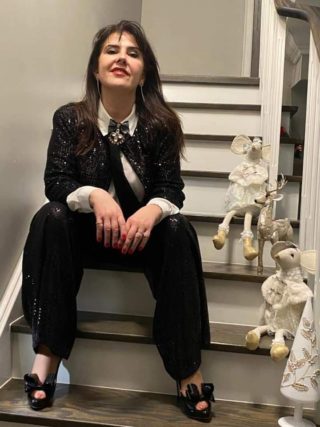Avdulla Kënaçi: THE WALTZ OF A GHOST WEDDING

Hello my friend, Thanas,
I just finished reading your recently published novel “The waltz of a ghost wedding”. It was a beautiful surprise; I was amazed seeing step by step the fate of the characters you gave birth to, painted and introduced so vividly and tangibly. This subject belongs to a period that my generation has experienced painfully, because we were born, educated and worked for a long time with the slogan “In one hand the pickaxe and in the other the rifle”. The pickaxe, this primitive tool as old as humanity itself, was used to produce bread, (only bread, oh God, the minimum vital requirement to keep the spirit alive), when in the rest of the world agriculture was mechanized and no process was carried out with arms and rifle was used to fight each other, not the external enemy we did not notice anywhere. We humans, to each other were like wolves, and not the most beautiful perfect creature in this earth as God intended.
I was amazed reading true literature from you, Thanas Medi, inspired, full of fantasy and drama. You have once again brought before our eyes the class struggle, this devilish, anti-human Marxist invention, equal to the saying “man for man is a wolf”. What we experienced in the period of the aggressive class war, led by the party-state, some more and some less (the man was either a hammer or a nail), you brought to the novel with a lot of talent and inspiration, mastery and art. As years go by , it seems as if this wound is healing and nothing has happened in the history of our nation; there was no class war, no shooting, no concentration camps, prisons and unimaginable torture. Today, a thirty year old Albanian citizen, finds it hard to believe us, but it would still be impossible for him not to be shaken by reading your latest novel “The waltz of a ghost wedding”. There the class struggle is tangible, lively, shocking and frightening. It also existed in a southern province, the base of the Liberation War from fascism, a seemingly quiet, underprivileged farm, but this tranquility was destabilized, shattered and destroyed with the arrival of a condemned family (“class enemies”). A couple with their beautiful daughter named Markela. They came with punishment from the capital to “cleanse themselves” of the bourgeois-revisionist ideology and bad habits, from “garbage’s” (so called isms) in their heads. They had to live in a barn and do hard work that they had never dreamed of doing. The main character, the beautiful Markela is the catalyst, the cause that teared the seeming tranquility of the farm village and unfold like a black sheet, the terrible class struggle, with all its unparalleled cruelty.
This is your virtue, your rare talent, dear friend, that reminds us and brings alive that morbid time. You have not let it be forgotten and buried, but you have described and brought it tangible before the readers, addressing both generations; those who have experienced it and those who have only heard it. You have not let it be forgotten. Not only have you put the seal on that dark period, but you have indirectly made the plea: beware, the monster can rise again and torture us worse than what has tortured us before. By reading your novel, the younger generation who will continue to increase, will not only be shocked, but will pull their hair, cry, wail and shout: How could you people endure and live so long under the weight of fear and with hypocrisy both in life and even in the most beautiful and sacred thing…in love ?!
I think you have built precise lines throughout the novel, composing it precisely, like a first-hand architect. The fiction flows naturally and is completely believable. The drama, which is increasing, from chapter to chapter, snatches and keeps you afloat. The reader impatiently awaits until the conflict finds a reasonable solution. The three main characters, in my opinion; The mesmerizing but penalized Markela, the naive righteous Lekoja and the unreadable Andoni, are painted in vivid and completely true colors. The two boys in love with the exiled beauty, Markela, although different characters and rivals, complement each other. Lekua, straightforward, straightforward, brave but gullible and slightly ugly, reminds you of Hugo’s Quazimodo, while Andoni, smart, cunning and illegible, is the type of survivor in any circumstance, slippery, watery, but who pays dearly for his hypocrisy by burning like a candle from the fire of love, to the extent of inventing a ghost wedding. (An artistic hit finding for extremely suitable title). The two boys, childhood friends, though rivals in love, are both under the grip and pressure of the class war machine gun, embodied in the hated character of
Gafur Bishes (Beast Crab)
He has thrown his iron net all over the farm and its people. Nothing escapes his predatory eyes, neither arguments, relationships, nor disagreements. He is the knife, the sword that hungs day and night over all the residents of the farm, even the communists. He burns and scorches the young and most beautiful sprouts of the village, Markela, Leko and Andoni. Shocking is the scene when the father denounces the son for the sake of the Party and its dogmatic principles, painful is the arrest of a young man who speaks openly, just as he sees the truth, without a fear in his eyes. Rightfully chosen is the word “skuth” (insidious) that indicates and symbolizes all the work of state security that continuously follows the condemned, but also to all others who have any kind of relation with them. It is precisely the application of this class-war that poisons, destroys love, youth and human relations in the village. You did not only perform a precise autopsy of the war of classes, but with this realistic work, you embalmed it and forever sent it to historical museums.
The environment, the weather and the villages themselves, the scenes where the events are set and the subject is elaborated, are so beautifully and poetically described that they remain alive in our memory. You are an excellent connoisseur of village life, of the virgin nature and the processes of work and relations in the so-called socialist system. Reading many of these pages written in the form of poetic prose, it is naturally easy for the reader to think that the author must have written poetry in his youth years. An army of dialectal words from the South of Albania booms and enhances the content, used appropriately and carefully as bran, (dragged) vithisej (collapsed), shastisur (confused), vandak (grass pile, sedesh), rokan (plane) (shpur), kalldisur (skin and bone), sillois (think), çallëk (light-minded), vakërroi (bregëriti), guç (bite), hallushi (aunt’s husband), vërvitur (running), pezule (zgrip), etc.
Thank you for the pleasure you give by taking us back in time, dear friend… Wishing you future impressive work like the novel “The Waltz of a Ghost Wedding”!
Friendly
Avdulla Kënaçi
Canada, Shkurt 2021.
